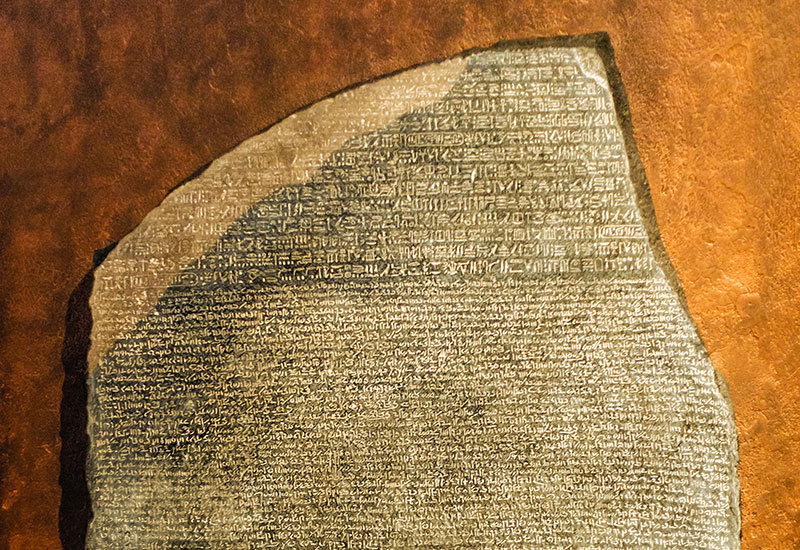Pierre Bouchard changed the world on this day in 1799.
Bouchard was one of Napoleon Bonaparte’s soldiers. When Napoleon invaded Egypt in 1798, he took along a group of scholars and instructed them to seize all important cultural artifacts for France. Bouchard, aware of this order, found a basalt stone at a fort near Rosetta and seized it. When the British defeated Napoleon two years later, they took possession of what is known to the world as the Rosetta Stone.
I have seen it displayed in the British Museum and marveled at its historical significance. The stone contains writing in Greek, Egyptian demotic, and Egyptian hieroglyphics. Using Greek as their guide, scholars were able for the first time to unravel the meaning of the hieroglyphics, opening the language and culture of ancient Egypt to the world.
From the historical to the mundane: if you take a scan of your face with your phone, toy maker Hasbro will use it to create a custom-made, look-alike action figure with your likeness on it. You can become a Ghostbuster, Power Ranger, or X-wing pilot, among other options.
We all want to leave a legacy that matters. We scratch our initials on tree trunks and in wet concrete. We engrave the names of our loved ones on tombstones, hoping our loved ones will do the same for us one day (if the Lord tarries). We want to do something with our lives that outlives us.
However, many of history’s greatest achievements were made by people unknown to all but historians. Even though I have stood several times before the Rosetta Stone in London, I did not know the name of its discoverer until today. We could say the same with many of the discoveries that have changed our lives, from computer technology to COVID-19 vaccines.
The best way to leave a legacy in history, as it turns out, is to turn our lives over to the Lord of history and of eternity.
Reframing obedience as opportunity
Jesus’ call to discipleship was holistic and unconditional: “If anyone would come after me, let him deny himself and take up his cross daily and follow me” (Luke 9:23, my emphasis). We are to “present your bodies as a living sacrifice” to God (Romans 12:1), to be “crucified with Christ” (Galatians 2:20). Our Father wants a transformational relationship with each of us.
By contrast, the Greco-Roman world developed a transactional relationship with their gods. They sacrificed to them so the gods would then do what they wanted them to do. If they were going to war, they made offers to Mars or Ares; if they sought wisdom, they would sacrifice to Athena. They separated the spiritual from the secular, Sunday from Monday, religion from the “real world.”
Unfortunately, many of us have adopted this understanding of obedience. We view God’s call to obey his word as a legalistic demand on our lives. We accede to it as a necessary means to a better end, hoping that he will repay our service by answering our prayers and blessing our lives.
Today, let’s reframe obedience as an opportunity to respond in gratitude to the grace of our loving Lord. Let’s view obedience to our Father’s word and will as our chance to offer him the worship he deserves while receiving in return all that his grace intends to give.
In today’s reading in My Utmost for His Highest, Oswald Chambers calls us to such intimacy with Christ and notes, “When we do see him we obey him instantly. He is easily Lord, and we live in adoration of him from morning till night. The revelation of my growth in grace is the way in which I look upon obedience.”
Surrender positions us in God’s best plan for us
Last Saturday was the fifty-third anniversary of the launch of Apollo 11, the American spaceflight that first landed humans on the moon. Billy Graham wrote that the astronauts “were able to succeed because they steered the Apollo 11 craft along a very narrow trajectory through space. No deviation was permitted, and flight corrections were made periodically throughout the historic voyage.”
Then he asked, “Suppose the NASA control center in Houston had received word from Apollo 11 that the astronauts were off course and had replied, ‘Oh, that’s all right. A number of roads will take you to the moon. Just keep on the way you are going.’” He replied, “You and I know they would have kept going—but they would never have come back.”
Jesus was clear: “The gate is narrow and the way is hard that leads to life, and those who find it are few” (Matthew 7:14). To any destination there is ultimately only one road. If you wanted to drive from my office to my house in Dallas, there are several roads you could choose to begin your journey. However, the farther you travel, the fewer your options would become until finally you must choose the one road that leads to my home.
It is the same with God’s eternal life in heaven and his abundant life on earth: he has a will that is “good and acceptable and perfect” for each of us (Romans 12:2). He has a plan to use us for eternal purposes in this temporal world.
But, as is often said, God gives his best to those who leave the choice with him.
“We are far too easily pleased”
C. S. Lewis observed in The Weight of Glory, “It would seem that our Lord finds our desires not too strong, but too weak. We are half-hearted creatures, fooling about with drink and sex and ambition when infinite joy is offered us, like an ignorant child who wants to go on making mud pies in a slum because he cannot imagine what is meant by the offer of a holiday at the sea. We are far too easily pleased.”
The Lord called his people, “Stand by the roads, and look, and ask for the ancient paths, where the good way is; and walk in it, and find rest for your souls” (Jeremiah 6:16).
Whose path will you walk today?



